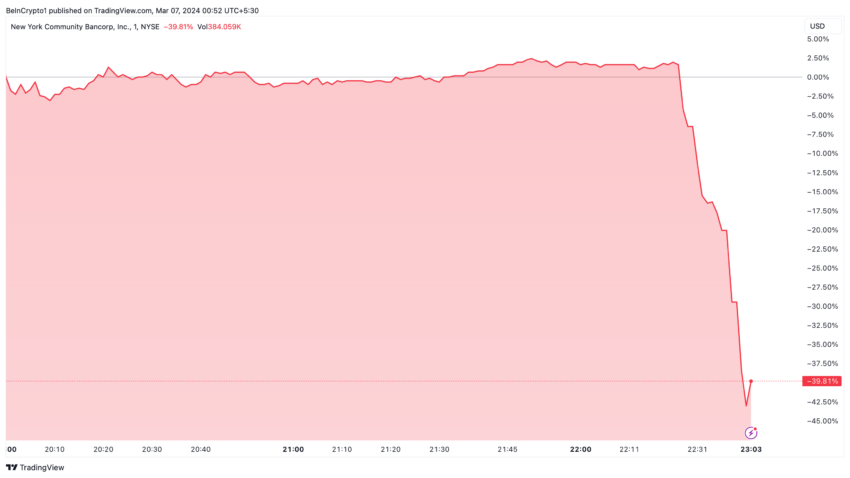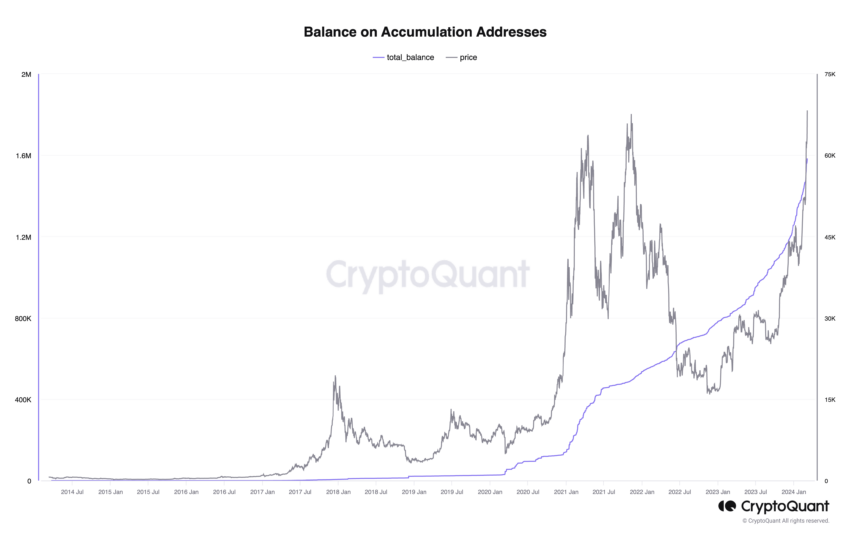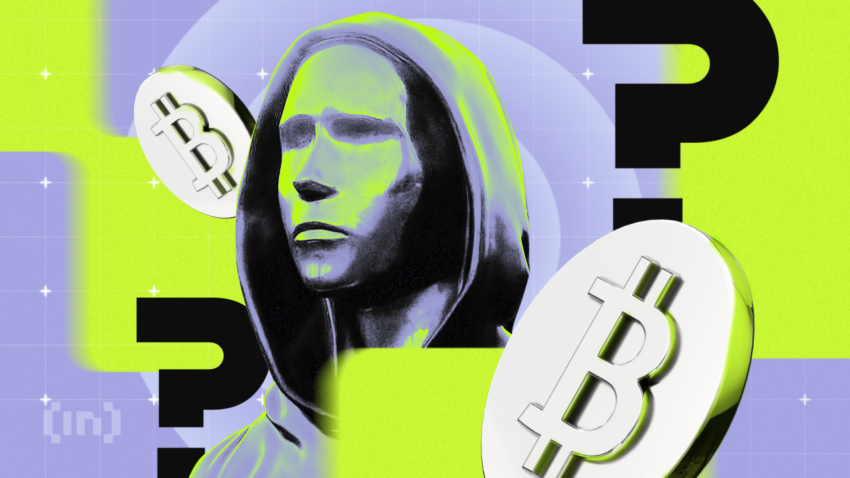In a dramatic turn of events that echoes the prescient warnings of Satoshi Nakamoto, the creator of Bitcoin, the financial system witnessed another stark contrast between the faltering traditional banking sector and the growing cryptocurrency market.
The spotlight shone brightly on New York Community Bank (NYCB), which experienced a precipitous decline in its stock value. It plunged over 40% in the wake of alarming revelations about its financial health and management disruption. This turbulence occurred against Bitcoin’s 58% year-to-date ascent to a fresh all-time high of $69,000.
NYCB Goes Bust While Bitcoin Hits Record Highs
The plight of NYCB, a regional lender based in Hicksville, New York, became public knowledge when it disclosed a “material weakness” in its internal controls. This led to a staggering $2.4 billion loss for shareholders last quarter.
A leadership reshuffle compounded the bank’s woes. Alessandro DiNello assumed the roles of president and CEO while a series of credit rating downgrades pushed NYCB’s debt into junk territory.
This series of misfortunes mirrored the earlier collapse of First Republic Bank. Therefore, it hinted at a potential systemic issue within the regional banking sector. Still, NYCB grappled with its internal turmoil and secured a major cash infusion amid the possible erosion of depositor confidence.
“In evaluating this investment, we were mindful of the Bank’s credit risk profile. With the over $1 billion of capital invested in the Bank, we believe we now have sufficient capital should reserves need to be increased in the future to be consistent with or above the coverage ratio of NYCB’s large bank peers,” Former United States Secretary of the Treasury Steven Mnuchin said.
Read more: US Banking Crisis Explained: Causes, Impact, and Solutions

This financial distress starkly contrasted with the flourishing crypto market. Unprecedented investment and accumulation of Bitcoin have signaled a robust vote of confidence from both new and veteran investors.
Significant inflows into accumulation addresses underpin Bitcoin’s resilience and growth. Likewise, growing exchange-traded fund (ETF) holdings reflect an increasing Bitcoin demand that contrasts with the instability plaguing the traditional banking industry.
This divergence reflects a broader shift in investor sentiment, seeking refuge in what many perceive as a more decentralized and secure financial future.
“The total Bitcoin holdings of accumulation addresses also reached record-high levels. The total holdings at these addresses are now 1.5 million Bitcoin. These addresses denote investors that only accumulate Bitcoin and have never sell, so the accelerating growth in their Bitcoin holdings is a sign of strong demand,” analysts at CryptoQuant told BeInCrypto.

However, it is not all smooth sailing for Bitcoin. Despite the growing demand and reaching new price heights, other indicators suggest Bitcoin might be entering an overheated phase. These metrics reveal a complex time where rapid gains could precipitate equally swift retractions.
“A short-term pause/correction may be brewing as prices have increased too fast in relation to key on-chain metrics… Moreover, traders’ unrealized profit margins are now above extreme levels, which can anticipate selling pressure from these market participants,” analysts at CryptoQuant added.
Read more: Bitcoin Price Prediction 2024 / 2025 / 2030
As Bitcoin continues to chart its course, the fate of traditional banks may serve as cautionary tales for an industry at a crossroads, navigating the challenging waters of modern finance in the shadow of Satoshi Nakamoto’s remarks.
“Banks must be trusted to hold our money and transfer it electronically, but they lend it out in waves of credit bubbles with barely a fraction in reserve. We have to trust them with our privacy, trust them not to let identity thieves drain our accounts,” Satoshi Nakamoto wrote.
Disclaimer
In adherence to the Trust Project guidelines, BeInCrypto is committed to unbiased, transparent reporting. This news article aims to provide accurate, timely information. However, readers are advised to verify facts independently and consult with a professional before making any decisions based on this content. Please note that our Terms and Conditions, Privacy Policy, and Disclaimers have been updated.


